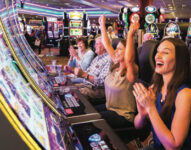
The research and experience of casino operators in jurisdictions around the world suggest that restrictive smoking policies have deleterious effects on gaming volumes. However, very few research studies on the social and economic impacts of nonsmoking constraints have been conducted in gaming facilities owned by tribal governments.
In spite of a relative lack of empirical research, informal outreach across tribal casino operations in California reveals that most tribal casino operators share similar concerns about whether nonsmoking constraints hurt gaming volumes.
Starting in 2008, a coalition of public health professionals began working with two tribes in California to establish smoke-free policies at their casinos. The coalition collected data on air quality and surveyed both patrons and staff at tribal properties. Employees and patrons alike expressed concerns about the risks of regularly breathing secondhand smoke, including an increased risk for lung cancer, stroke and heart disease. While doing their research, public health professionals found that 63 percent of casino patrons surveyed indicated that they would visit more often or equally as often if the casino went completely smoke-free.
After receiving these research results in 2014, tribal leaders from one of the tribes, along with 100 percent of tribal membership, supported adopting a nonsmoking policy at their casino. Ultimately, the tribe decided to make their new casino completely smoke-free, only the second casino in California to do so.
After going nonsmoking in 2014, the tribe’s casino began to see revenues fall, since many casino guests in this repeater-market property enjoyed smoking while they gamble. Ultimately, the tribe and its casino management team modified its policy to remain 70 percent non-smoking. The hotel, restaurants, poker room and Events Center remained smoke-free. The tribe and casino management also committed to ensuring that popular games and machines are available in nonsmoking areas, and to upgrading their overall filtration systems.
This early tribal case, along with prior work in commercial casino jurisdictions, reveals that the No. 1 reason for allowing smoking in tribal casinos (or commercial casino properties) is the widely held belief by casino operators that nonsmoking constraints negatively impact gaming revenues. However, rarely have these claims been studied empirically in more than one property, across several variables and over a significant period of time.
In the spring of 2018, my colleague at San Diego State University, Dr. David Kamper, and I applied for funding from the California Department of Public Health to pursue a rigorous, scientific and objective evaluation of such claims about the impact of nonsmoking constraints on machine volumes in tribal casino operations, with the larger aim of supporting tribal casino operators to make informed decisions regarding nonsmoking policies at their properties. Last fall, we received the news that our funding request has been granted.
While employee and patron surveys have been conducted at a handful of tribal casinos in California, this survey data has never been triangulated with gaming volume data. Our SDSU study will be the first of its kind by introducing game performance analysis of smoking versus nonsmoking sections into the assessment of nonsmoking constraints on tribal casino operations. In addition to performing several analyses of game performance, our study will look at the changes in smoking versus nonsmoking section performance over time to examine whether any negative effects on gaming performance following the introduction of nonsmoking constraints become smaller over time, revealing an adaptation effect.
Over the next four years, we will collaborate with between six and nine tribal governments and casinos in California. Several data collection strategies will be employed. For the game performance analysis, tribal casino operators (most likely slot operations managers) will be asked to complete a data input sheet covering at least six months of data for both smoking and nonsmoking sections.
The data input sheet will ask for information ranging from the number of working games to the gross coin-in to the total win and the total slot player head count. Operators will also be asked to provide information related to property-specific events that may affect game performance independent of nonsmoking constraints, such as anniversary parties, lottery drawings or concerts.
In addition to collecting gaming data, we will with tribal casino operators conduct intercept surveys to gauge the importance of the nonsmoking section in the patronage decision. Also, we will conduct surveys with employees to gauge the importance of the nonsmoking section in their employment and/or job selection decision.
These surveys should also provide insight regarding views, opinions and attitudes toward nonsmoking sections. The data will be collected using employee and patron surveys used in prior research on this topic in order to do comparative analysis.
We expect that the findings from the game performance analysis will indicate the dollar value of any difference in the game-level performance across the smoking condition and whether such differences are statistically significant, including whether they signal an adaptation effect over time. Patron and employee survey data will provide a broader perspective on the value and effect of nonsmoking sections on casino patronage and casino employment decisions, while also providing something of a triangulation function.
The research collaboration we are developing with tribal casino operators in California is also meant to serve as a model of research for other projects that are supported by the Sycuan Institute on Tribal Gaming at San Diego State University. That is, we strive to encourage research that produces actionable results for tribal governments and tribal casino operators while also encouraging the use of empirical data to inform business and government decision-making.
We look forward to sharing the results of this important work as it becomes available, and encourage any interested tribes to reach out to us to participate in this historic project.











